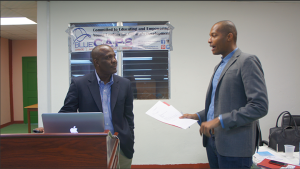Leadership is one of the most widely talked about subjects and at the same time one of the most elusive and puzzling. Guyanese often yearn for great, transcending leadership for their communities, universities, sports teams, and for the nation. However, we have an almost love-hate ambivalence about power wielders. And we especially dislike anyone who tries to boss us around. Yes, we admire the Washingtons and Churchills, but Hitler and Al Capone were leaders too and that points up a fundamental problem. Leadership can be exercised in the service of noble, liberating, enriching ends, but it can also serve to manipulate, mislead and repress.
“One of the most universal cravings of our time,” writes James MacGregor Burns, “is a hunger for compelling and creative leadership.” But exactly what is creative leadership? A Wall Street Journal cartoon had two men talking about leadership. Finally, one turned to the other in exasperation and said: “Yes, we need leadership, but we also need someone to tell us what to do.” That is to say, leadership for most people most of the time is a rather hazy, distant and even confusing abstraction. Hence, thinking about or defining leadership is a kind of intellectual leadership challenge itself. Leadership I believe is inevitably to be linked or merged with the study of followership. We cannot really study leaders in isolation from followers, constituents or group members. The leader is very much a product of the group, and very much shaped by its aspirations, values and human resources. The more we learn about leadership, the more the leader-follower linkage is understood and reaffirmed. A leader has to resonate with followers. Part of being an effective leader is having excellent ideas, or a clear sense of direction, a sense of mission. But such ideas or vision are useless unless the would-be leader can communicate them and get them accepted by followers. A two-way engagement or two-way interaction is constantly going on. When it ceases, leaders become lost, out of touch, imperial or worse. And those last few words portray vividly what has become of the many politicians in leadership and not leadership in politicians of this dear land of Guyana.
-R. St.Louis
